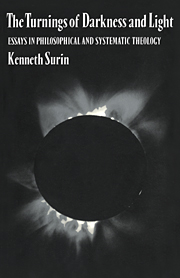Book contents
- Frontmatter
- Contents
- Dedication
- Preface
- Abbreviations
- 1 Creation, revelation and the analogy theory
- 2 The Trinity and philosophical reflection: a study of David Brown's The Divine Trinity
- 3 ‘Is it true what they say about “theological realism”?’
- 4 The impassibility of God and the problem of evil
- 5 Theodicy?
- 6 Tragedy and the soul's conquest of evil
- 7 Atonement and moral apocalypticism: William Styron's Sophie's Choice
- 8 Atonement and christology
- 9 Revelation, salvation, the uniqueness of Christ and other religions
- 10 ‘Many religions and the one true faith’: an examination of Lindbeck's chapter 3
- 11 Contemptus mundi and the disenchanted world: Bonhoeffer's ‘discipline of the secret’ and Adorno's ‘strategy of hibernation’
- 12 ‘The weight of weakness’: intratextuality and discipleship
- 13 ‘Theistic arguments’ and ‘rational theism’
- Notes
- Index of names
- Index of subjects
9 - Revelation, salvation, the uniqueness of Christ and other religions
Published online by Cambridge University Press: 19 January 2010
- Frontmatter
- Contents
- Dedication
- Preface
- Abbreviations
- 1 Creation, revelation and the analogy theory
- 2 The Trinity and philosophical reflection: a study of David Brown's The Divine Trinity
- 3 ‘Is it true what they say about “theological realism”?’
- 4 The impassibility of God and the problem of evil
- 5 Theodicy?
- 6 Tragedy and the soul's conquest of evil
- 7 Atonement and moral apocalypticism: William Styron's Sophie's Choice
- 8 Atonement and christology
- 9 Revelation, salvation, the uniqueness of Christ and other religions
- 10 ‘Many religions and the one true faith’: an examination of Lindbeck's chapter 3
- 11 Contemptus mundi and the disenchanted world: Bonhoeffer's ‘discipline of the secret’ and Adorno's ‘strategy of hibernation’
- 12 ‘The weight of weakness’: intratextuality and discipleship
- 13 ‘Theistic arguments’ and ‘rational theism’
- Notes
- Index of names
- Index of subjects
Summary
Karl Barth is widely held to be the foremost modern proponent of the principles (i) that Jesus Christ is the decisive, unrepeatable and unsurpassable ‘locus’ of divine revelation; and (ii) that consequently it is only by following the way of Christ that humankind can possibly hope for its ultimate salvation. These Barthian principles find expression in the following passage of The Church Dogmatics:
Jesus Christ does not fill out and improve all the different attempts of man to think of God and to represent him according to his own standard. But as the self-offering and the self-manifestation of God he replaces and completely outbids these attempts, putting them in the shadows to which they belong…. The revelation of God in Jesus Christ maintains that our justification and sanctification, our conversion and salvation, have been brought about and achieved once and for all in Jesus Christ. He is the assistance that comes to us. He alone is the Word of God that is spoken to us.
A further indication of Barth's uncompromising ‘Christocentrism’ is provided by his characterization of revelation:
Just as a man can have only one father, is born once and dies once, so he can only believe and know one revelation. It is possible to collate and compose a number of religions, not a number of revelations. He who says revelation says – a revelation which is unique, taking place once for all, irrevocable and unrepeatable.
- Type
- Chapter
- Information
- The Turnings of Darkness and LightEssays in Philosophical and Systematic Theology, pp. 136 - 158Publisher: Cambridge University PressPrint publication year: 1989



